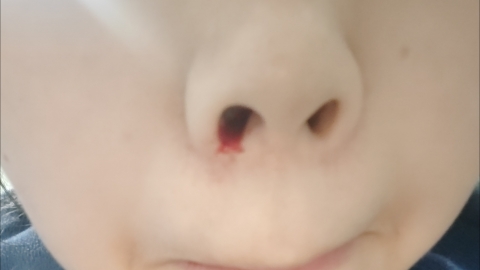What are the causes of frequent nosebleeds?
Generally, frequent nosebleeds may be caused by low air humidity, unhealthy eating habits, allergic rhinitis, nasal polyps, aplastic anemia, and other factors. If discomfort occurs, timely medical consultation is recommended. Detailed analysis is as follows:
1. Low Air Humidity
When air humidity is too low, the nasal mucosa loses moisture, becoming dry and fragile. Nasal blood vessels may rupture easily from minor irritation, especially common during winter heating seasons or prolonged stays in air-conditioned environments. Using a humidifier indoors to maintain humidity at about 50%-60% is advisable. Nasal irrigation with saline spray two to three times daily helps keep nasal mucosa moist. Drinking sufficient water to maintain hydration is also important.
2. Unhealthy Eating Habits
Long-term consumption of spicy, irritating, or fried foods, or a diet lacking in nutrients like vitamin C and vitamin K, can impair nasal mucosal repair capacity and reduce vascular elasticity, increasing the risk of nosebleeds. Adjusting dietary habits by reducing spicy and fried foods while increasing intake of vitamin C-rich foods such as oranges, kiwifruit, and spinach, as well as vitamin K-rich foods like broccoli, lettuce, and egg yolks, is recommended. Maintaining a light and balanced diet and avoiding overeating are also important.

3. Allergic Rhinitis
Exposure to allergens such as pollen or dust mites can cause nasal mucosal swelling and congestion in individuals with allergic rhinitis. Frequent sneezing and runny nose further irritate the mucosa, potentially causing bleeding. Avoiding allergen exposure and wearing a mask outdoors are recommended. Under medical guidance, antiallergic medications such as cetirizine hydrochloride drops, loratadine syrup, or fexofenadine hydrochloride tablets may be used, along with mometasone furoate nasal spray to alleviate nasal inflammation.
4. Nasal Polyps
Nasal polyps occupy nasal space, compress surrounding mucosa, impairing blood circulation. The thin mucosal surface of polyps is prone to bleeding from friction or infection, often accompanied by persistent nasal congestion and reduced sense of smell. Small polyps may be treated under medical supervision with nasal sprays such as budesonide, fluticasone furoate, or triamcinolone acetonide, with monitoring of polyp changes. If polyps are large or drug treatment ineffective, surgical removal under medical guidance may be necessary, with regular follow-ups to prevent recurrence.
5. Aplastic Anemia
Aplastic anemia leads to bone marrow failure, reducing platelet count and impairing coagulation function, causing spontaneous nosebleeds that are difficult to stop. Symptoms may include skin bruising, gum bleeding, and fatigue. Treatment under medical supervision may involve medications such as cyclosporine soft capsules, stanozolol tablets, or testosterone undecanoate soft capsules. Severe cases may require hematopoietic stem cell transplantation. Preventing trauma and strenuous exercise to avoid bleeding, and regular monitoring of blood counts and coagulation function are essential.
In daily life, maintaining nasal hygiene and avoiding nose picking is important. Dressing appropriately according to weather changes helps prevent colds and other respiratory diseases. Following medical advice for examinations and treatment is crucial. Immediate medical attention is necessary for frequent or heavy nosebleeds, or if symptoms such as dizziness or palpitations occur. Medications should be stored out of children's reach, used according to prescribed dosages and duration, and stored under appropriate conditions.









